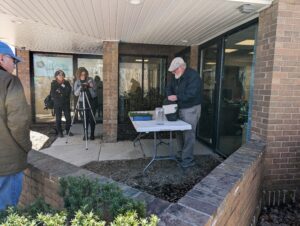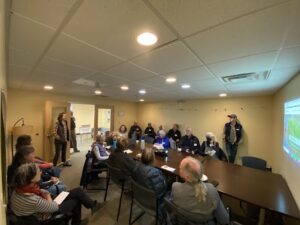By Clint McGill, Easement Stewardship Manager
When Legacy joined the American Farmland Trust Soil Health Stewards Program in 2022, expanding our network of soil health professionals to direct landowners to specific resources and help them improve the health of their soil was an integral piece of our action plan.
Since the training two years ago, we’ve been busy laying the ground work and sharing stories about our participation in the program–adding nutrients to enrich the soil, if you will–and we’re beginning to see the fruits of our labor!
After reading one of our articles, John A. Freeland, Ph.D., SPWS, a soil scientist and consultant reached out to me. He offered his extensive expertise to assist Legacy in promoting soil health to our community and the conservation easement landowners with whom we work. We talked a few times over the course of a year, and even met with Dr. Freeland for assistance and a special learning opportunity at one of our conservation easements.
It didn’t take long for us to realize based on our conversations that Dr. Freeland would be a perfect match for our annual Land Partner Gathering, and we were honored to have him join us as our presenter in April this year!
Legacy landowners snacked on expertly baked Q Bakehouse & Market pastries while Dr. Freeland captivated listeners with his presentation Soil Health: Enriching Soil, Enhancing Life.
During our two hours together, Dr. Freeland covered a wide range of soil health information including the role of soil in our food systems, our built world, and the environment and how they may be positive or negative depending on biodiversity, plant productivity, nutrient cycling, air and water quality, and aesthetics.
He also emphasized that when it comes to soil health, soils are open systems that interact with abiotic factors like the atmosphere, groundwater, and surface waters, as well as biotic factors and living organisms like plants, decomposed plant matter, animals, bacteria, fungi, and invertebrates.
Dr. Freeland broke down the five soil forming factors, the chemistry of soil, the four components of soil, and many other detailed topics including:
- key concepts like soil textures (clay, loam, sandy), structure, organic matter, and detailed the rhizoshpere, the space in soil around plant roots where nutrient exchange, respiration, chemical processes, and mycorrhizal and microbial interactions take place.
- how geological history, climate, topography, and time have worked together to produce different types of soils.
- that soil is a reservoir for water and nutrients, and a medium for nutrient cycling.
The group was also treated to a live demonstration [similar to the one in this video] highlighting the importance of cover crops and keeping living roots in the soil as long as possible. Dr. Freeland simulated a rain event over bare soil and soil with vegetation.
While the “rain” that ran off the bare soil flowed fairly quickly without much infiltration into the soil and carried with it a lot of sediment, we saw the opposite on the soil with vegetation. There was much more infiltration of the “rain” into the soil, and water that did run off did so more slowly and was practically clear by the time it flowed across the soil. [Watch another example of this type of demonstration and others here.]
Like so many things, soil is far more complex than one might expect at first glance. The presentation was packed with information, so if you are interested in receiving a copy of Dr. Freeland’s presentation or other details about managing soil health, please get in touch with me at [email protected].
A special thank you to Dr. Freeland for providing an amazing learning opportunity for our landowners!
Stay tuned for more information on soil health in the coming months! Two more members of Legacy’s staff recently participated in another round of American Farmland Trust’s Soil Health Stewards Training and they’ll be building on the work we’ve already begun.



 RSS Feed
RSS Feed